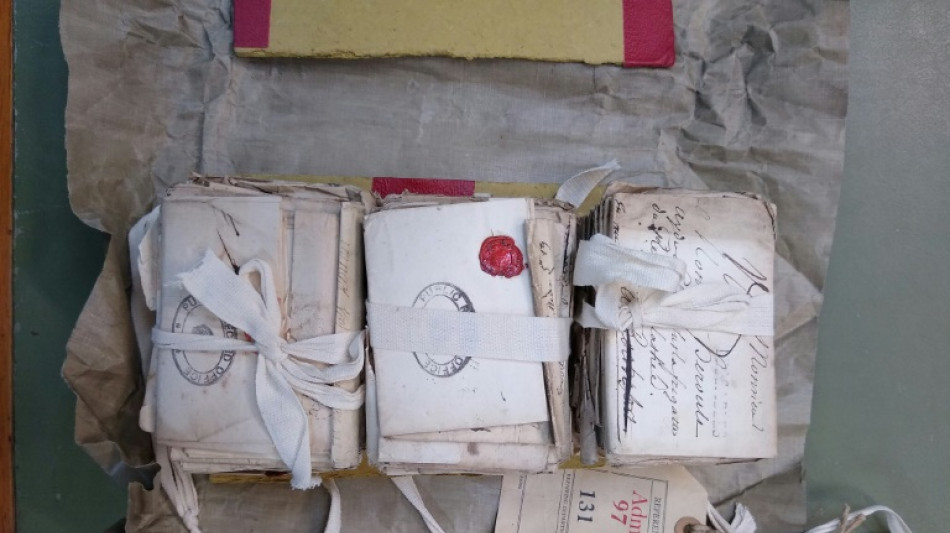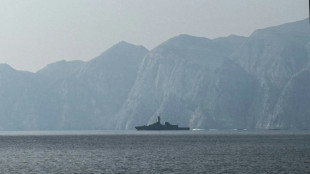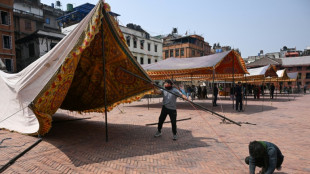
-
 Underdogs Wales could hurt Irish after Scotland display: Popham
Underdogs Wales could hurt Irish after Scotland display: Popham
-
Gilgeous-Alexander rules over Knicks again in Thunder win

-
 Hamilton reveals sequel in the works to blockbuster 'F1: The Movie'
Hamilton reveals sequel in the works to blockbuster 'F1: The Movie'
-
Alonso, Stroll fear 'permanent nerve damage' from vibrating Aston Martin

-
 China boosts military spending with eyes on US, Taiwan
China boosts military spending with eyes on US, Taiwan
-
Seoul leads rebound across Asian stocks, oil extends gains

-
 Tourism on hold as Middle East war casts uncertainty
Tourism on hold as Middle East war casts uncertainty
-
Bayern and Kane gambling with house money as Gladbach come to town

-
 Turkey invests in foreign legion to deliver LA Olympics gold
Turkey invests in foreign legion to deliver LA Olympics gold
-
Galthie's France blessed with unprecedented talent: Saint-Andre

-
 Voice coach to the stars says Aussie actors nail tricky accents
Voice coach to the stars says Aussie actors nail tricky accents
-
Rahm rejection of DP World Tour deal 'a shame' - McIlroy

-
 Israel keeps up Lebanon strikes as ground forces advance
Israel keeps up Lebanon strikes as ground forces advance
-
China prioritises energy and diplomacy over Iran support

-
 Canada PM Carney says can't rule out military participation in Iran war
Canada PM Carney says can't rule out military participation in Iran war
-
Verstappen says new Red Bull car gave him 'goosebumps'

-
 Swiss to vote on creating giant 'climate fund'
Swiss to vote on creating giant 'climate fund'
-
Google to open German centre for 'AI development'

-
 Winter Paralympics to start with icy blast as Ukraine lead ceremony boycott
Winter Paralympics to start with icy blast as Ukraine lead ceremony boycott
-
Sci-fi without AI: Oscar nominated 'Arco' director prefers human touch

-
 Ex-guerrillas battle low support in Colombia election
Ex-guerrillas battle low support in Colombia election
-
'She's coming back': Djokovic predicts Serena return

-
 Hamilton vows 'no holding back' in his 20th Formula One season
Hamilton vows 'no holding back' in his 20th Formula One season
-
Two-thirds of Cuba, including Havana, hit by blackout

-
 US sinks Iranian warship off Sri Lanka as war spreads
US sinks Iranian warship off Sri Lanka as war spreads
-
After oil, US moves to secure access to Venezuelan minerals

-
 Arteta hits back at Brighton criticism after Arsenal boost title bid
Arteta hits back at Brighton criticism after Arsenal boost title bid
-
Carrick says 'defeat hurts' after first loss as Man Utd boss

-
 Ecuador expels Cuba envoy, rest of mission
Ecuador expels Cuba envoy, rest of mission
-
Arsenal stretch lead at top of Premier League as Man City falter

-
 Title race not over vows Guardiola after Man City held by Forest
Title race not over vows Guardiola after Man City held by Forest
-
Rosenior hails 'world class' Joao Pedro after hat-trick crushes Villa

-
 Brazil ratifies EU-Mercosur trade deal
Brazil ratifies EU-Mercosur trade deal
-
Real Sociedad edge rivals Athletic to reach Copa del Rey final

-
 Chelsea boost top four push as Joao Pedro treble routs Villa
Chelsea boost top four push as Joao Pedro treble routs Villa
-
Leverkusen sink Hamburg to keep in touch with top four

-
 Love match: WTA No. 1 Sabalenka announces engagement
Love match: WTA No. 1 Sabalenka announces engagement
-
Man City falter as Premier League leaders Arsenal go seven points clear

-
 Man City title bid rocked by Forest draw
Man City title bid rocked by Forest draw
-
Defending champ Draper ready to ramp up return at Indian Wells

-
 Arsenal extend lead in title race after Saka sinks Brighton
Arsenal extend lead in title race after Saka sinks Brighton
-
US, European stocks rise as oil prices steady; Asian indexes tumble

-
 Trump rates Iran war as '15 out of 10'
Trump rates Iran war as '15 out of 10'
-
Nepal votes in key post-uprising polls

-
 US Fed warns 'economic uncertainty' weighing on consumers
US Fed warns 'economic uncertainty' weighing on consumers
-
Florida family sues Google after AI chatbot allegedly coached suicide

-
 Alcaraz unbeaten run under threat from Sinner, Djokovic at Indian Wells
Alcaraz unbeaten run under threat from Sinner, Djokovic at Indian Wells
-
Iran's supreme leader gone, but opposition still at war with itself

-
 Mideast war rekindles European fears over soaring gas prices
Mideast war rekindles European fears over soaring gas prices
-
'Miracle to walk' says golfer after lift shaft fall


Confiscated French love letters finally opened after 265 years
Undelivered letters written to French sailors during an 18th century war between Britain and France have finally been opened and studied -- after more than 250 years gathering dust.
The unread letters have provided a rare insight into the lives of sailors and their families in the 1700s, from the wife of a senior naval officer to an elderly mother chastising her son for not writing.
The Royal Navy seized the messages during the Seven Years' War, a global conflict that ended in 1763 that saw Britain and France lead rival alliances.
"I could spend the night writing to you... I am your forever faithful wife," wrote Marie Dubosc to her husband Louis Chamberlain, the first lieutenant of a French warship in 1758.
"Good night, my dear friend. It is midnight. I think it is time for me to rest."
Unknown to Marie, her husband's ship, the Galatee, had been captured by the British, researchers at the University of Cambridge found.
Louis never received the letter and his wife died the following year, almost certainly before he was released by the British.
In another missive dated January 27, 1758, the mother of young sailor Nicolas Quesnel from Normandy takes him to task about his lack of communication.
"I think more about you than you about me... In any case I wish you a happy new year filled with blessings of the Lord," 61-year-old Marguerite wrote in a letter probably dictated to someone else.
"I think I am for the tomb, I have been ill for three weeks. Give my compliments to Varin (a shipmate), it is only his wife who gives me your news," she added.
The Galatee was captured by the British en route from Bordeaux to Quebec in 1758.
- 'Universal human experiences' -
British Admiralty officials at the time deemed the letters of no military significance and the vast majority languished in the archives, unopened, until they attracted the attention of Cambridge history professor Renaud Morieux.
"I only ordered the box out of curiosity," said Morieux, whose findings were published on Tuesday in the journal "Annales. Histoire, Sciences Sociales".
Presented with three piles of very small letters held together by ribbon, Morieux said he "realised I was the first person to read these very personal messages since they were written".
"Their intended recipients didn't get that chance. It was very emotional," he said.
Morieux identified every member of the Galatee's 181-strong crew, with letters addressed to a quarter of them, and also carried out genealogical research into the men and their correspondents.
In 1758 alone a third of France's sailors were captured by the British.
Over the whole period of the Seven Years' War nearly 65,000 were imprisoned by the British.
Some died from disease and malnutrition although others were released.
Letters would have been the only means their families had of trying to contact them, said Morieux.
"These letters are about universal human experiences, they're not unique to France or the 18th century," he added.
"They reveal how we all cope with major life challenges.
"When we are separated from loved ones by events beyond our control like the pandemic or wars, we have to work out how to stay in touch, how to reassure, care for people and keep the passion alive," said the historian.
"Today we have Zoom and WhatsApp. In the 18th century, people only had letters but what they wrote about feels very familiar."
R.Flueckiger--VB




